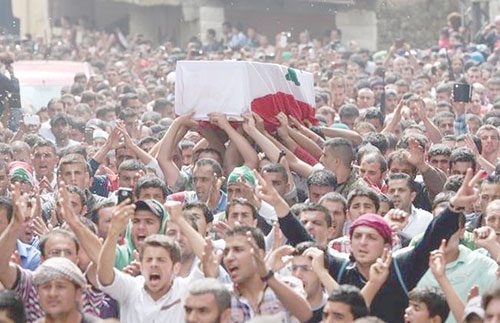
BEIRUT — The Lebanese cabinet gave the army the permission to use force at its own discretion to free hostages held by “Islamic State” and Nusra Front militants in east Lebanon, rejecting the kidnappers demands to exchange the captives from the Lebanese armed forces with Islamist prisoners.
The cabinet meeting on Thursday, Sept. 4, comes days after militants beheaded a Lebanese soldier to pressure the government to negotiate.
The government’s tough stance on the hostage crisis coincided with growing protests by the captives’ families, who gave the government 24 hours to act before they took matters into their own hands. Families called on the Army to arrest ministers and trade them for their loves ones.
“The Cabinet unanimously agreed that the safety of our sons kidnapped by takfiri organizations cannot be subject to compromise, negligence or swap because the state, with its institutions and security forces, will firmly confront anything that might endanger the lives of our sons,” Information Minister Ramzi Joreige told reporters after a cabinet session chaired by Prime Minister Tammam Salam.
In a clear allusion to escalating protests by the families of the captive soldiers and policemen, the cabinet warned against attempts to transform the hostage crisis into “a battle between citizens and the state at a time when combined efforts between the state and citizens should be geared toward fighting takfiri terrorists.”
Joreige said the Cabinet had given the Army and security forces political cover for launching any military operation to free the captives.
“The cabinet affirmed its support for the missions carried out by the army and security forces in Arsal and its surrounding and asked their commanders to take all necessary measures to bring the situation in Arsal under control and free the kidnapped soldiers,” Joreige said. “These are the two goals which will remain a subject of cabinet unanimity.”
A senior security source said some of the hostages were still inside Arsal, raising the prospect of a military operation to free them.
The Cabinet session was convened to formulate a plan to secure the release of 23 soldiers and policemen still held hostage, following five days of fierce fighting between the army and the militants in the northeastern town of Arsal last month.
The two militant groups have demanded the release of Islamist detainees in Roumieh Prison, some of whom have been held since 2007. The government and the judiciary decided earlier this week to speed up the trials of the prisoners.
Salam has opposed any negotiations between the government and the soldiers’ captors that would require a prisoner exchange.
During the session, Salam told the ministers that he had held secret contacts with countries that could help secure the release of the troops, Joreige said.
The 24-member Cabinet also agreed to continue needed contacts with countries that could have some leverage to release the soldiers.
The Cabinet tasked a crisis committee, headed by Salam, to follow up on the hostage crisis, and implement the Cabinet’s decisions.
Although reports have emerged that Qatar and Turkey are also mediating the release of the soldiers, an expected visit by Salam to Doha has not yet been scheduled.
“All the captured soldiers are safe, and were are trying to release all of them without exceptions,” local mediator Sheikh Mustafa Hujeiri told The Daily Star.
Earlier this week, the “Islamic State” handed over the body of Army Sgt. Ali al-Sayyed, whom militants beheaded. An IS-affiliated man who had posted a picture of Sayyed’s beheading posted a comment on social media Wednesday, saying the group was sharpening its knives and asking: “Are you going to negotiate or not?”
The families of the captives blocked the road to Riad al-Solh Square in Downtown Beirut to pressure the cabinet to secure the release of their loved ones.
Meanwhile, IS executed a Lebanese man from Arsal, the National News Agency reported Thursday. The victim was identified as Kayed Ghadadah.
Security sources said Ghadadah was kidnapped last week from his house in north Arsal and taken to the town’s outskirts close to the Syrian border. Media reports are indicating that IS executed Ghadadah for his ties to Hezbollah.
Separately, an Internal Security Forces document circulated on social media warned that at least three bomb-rigged vehicles were in the hands of terrorist gunmen following the Arsal fighting and that they might use them in some areas in Lebanon.
-TDS, TAAN






Leave a Reply